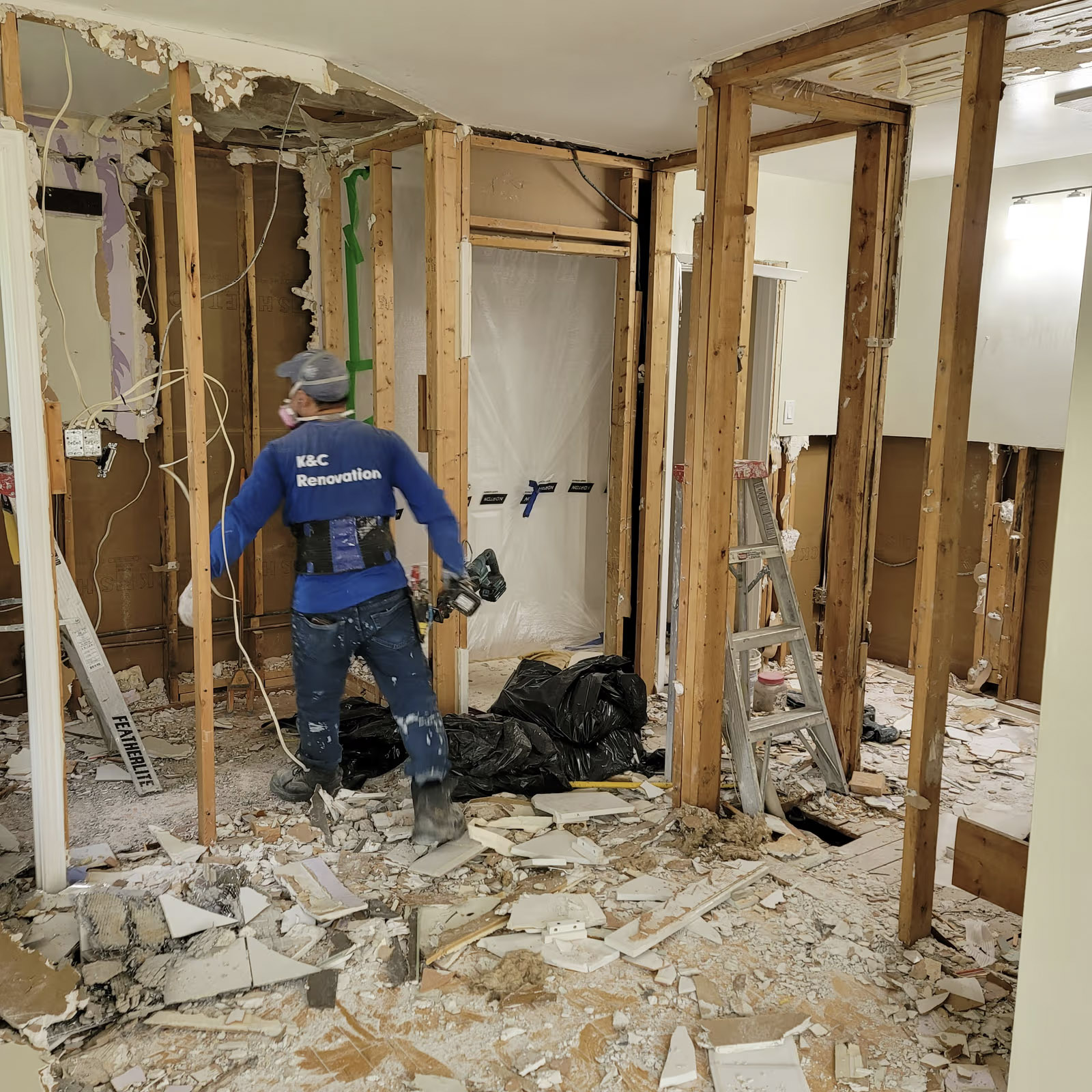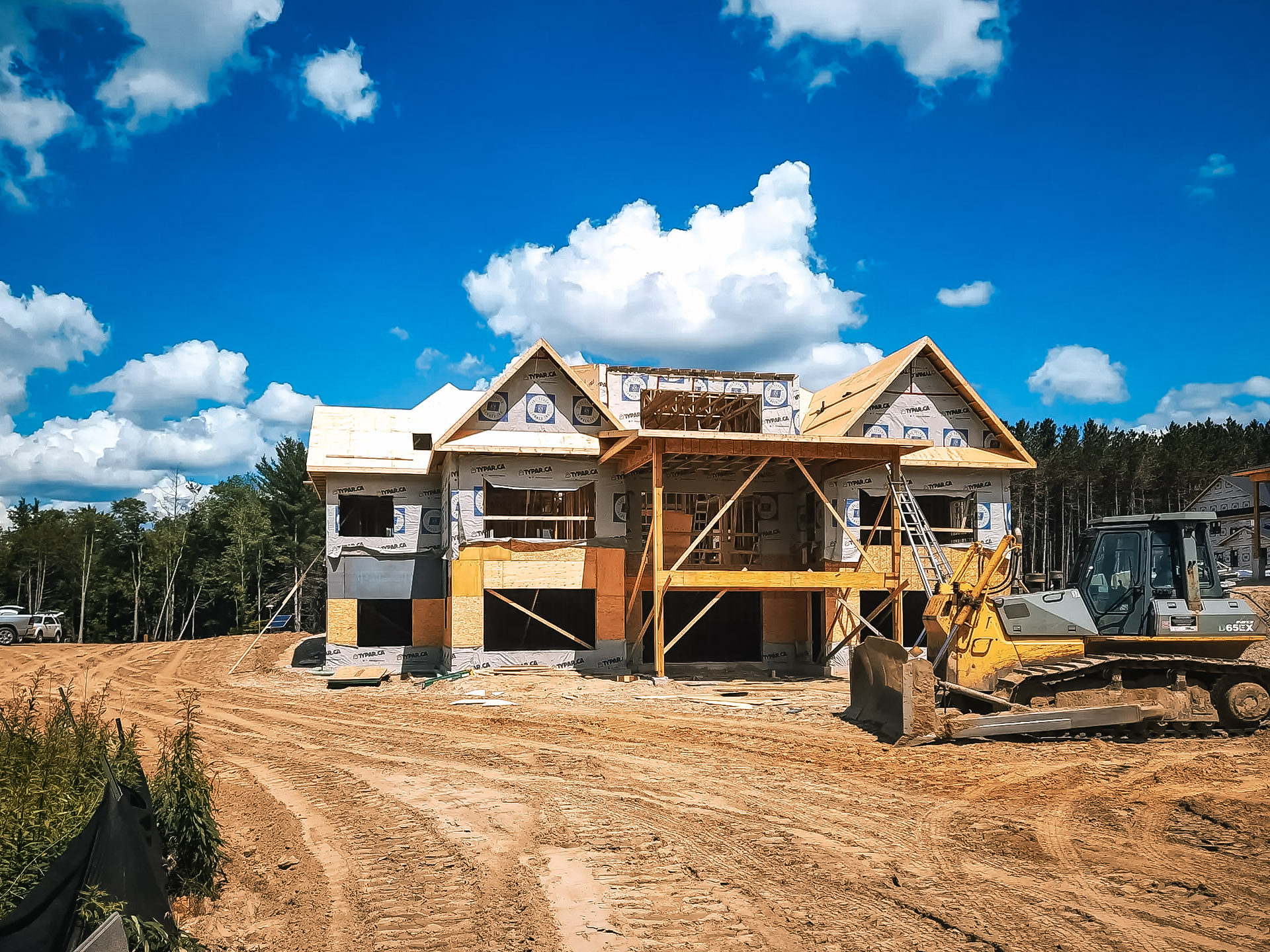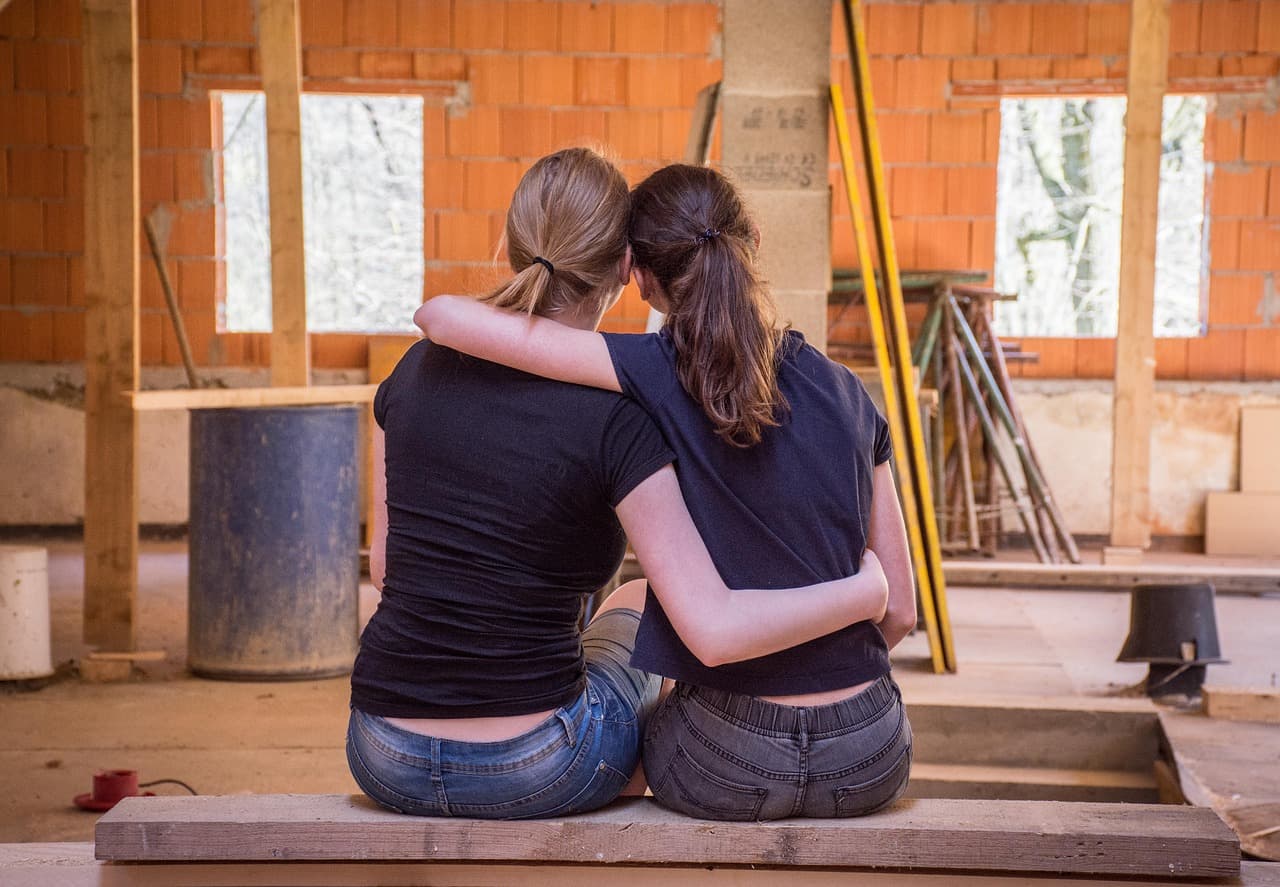Renovate or Move: A Homeowner’s Guide to Choosing the Right Next Step
By Editorial Team
Updated on February 12, 2026

If you’re stuck on “renovate or move,” you’re not alone. For many Canadian homeowners, the choice comes down to both numbers and real life: what you can afford, what your home is worth, what the market is doing, and how much disruption your household can handle.
Get Your Project Started Today
Submit your details and receive three free quotes from trusted contractors.
Early spring is also the ideal time to start planning renovations, as contractor schedules fill up quickly once the busy season begins. Booking professionals in advance gives you more choice, better timelines, and a smoother project overall. This guide helps you compare the two options in a clear, practical way—while encouraging you to plan ahead—so you can make a decision you’ll feel good about a year from now.
Start With the Real Question: What Are You Trying to Fix?

Source: Reno Quotes
Most renovate-or-move decisions begin with a specific friction point. Sometimes it’s space—like needing a home office, another bedroom, or a more workable kitchen. Other times it’s function, such as poor layout, accessibility needs, storage, or wanting energy-efficient renovations that lower monthly costs. And sometimes it’s location: the daily commute is wearing you down, the school district isn’t working anymore, or being close to family and friends nearby matters more than it used to.
That last category matters because renovation can solve a lot, but it can’t relocate your home. If the core issue is neighbourhood, commute, lot, or proximity to supports, moving tends to be the more direct solution. If the issue is how the home works for your life, renovation can be surprisingly competitive—assuming the home’s structure and systems aren’t hiding big problems.
Cost Comparison: Renovating Versus Moving in Canada

Source: KC Renovation
It’s tempting to compare a renovation budget to a purchase price and call it a day, but the real financial picture includes both initial and long-term costs. Renovations often start with contractor estimates and the cost of materials and services, then expand once you account for permits, building codes, and “while we’re in here” fixes. Even a straightforward project can trigger extra home repairs if you uncover outdated wiring, water damage, or other unexpected complications. If you can’t safely live in the space, temporary housing becomes part of the equation, and that can change what feels “affordable” very quickly.
Moving has its own stack of costs that don’t always feel obvious at first. Real estate fees and realtor commissions can take a meaningful bite out of your proceeds. Closing costs add up through legal fees and adjustments, and you may also face land transfer taxes depending on your province and municipality. Home inspection costs are another line item, along with moving costs like movers, storage, supplies, and time off work. On top of that, many buyers still end up doing home repairs soon after they arrive, even if the home “seemed fine” during showings.
Equity sits at the centre of this comparison. If renovating allows you to stay put while improving your home’s usability and property value, you may preserve (or grow) equity without paying transaction costs. If moving means downsizing, you may unlock equity. If moving means buying higher in a competitive real estate market, you may need more mortgage financing than expected and feel the squeeze in your monthly budget. In either case, try to think in “all-in” numbers rather than just sticker price.
Return on investment matters, too, but it should be treated as one input rather than the only goal. Some upgrades tend to support resale value more consistently—projects that improve core function, durability, and efficiency—while highly personal finishes may not translate into the same return on investment for future buyers. The best renovation is usually the one that solves your actual problem and still keeps your home competitive for your area.
Things to Think About When Deciding to Renovate or Move

Source: Reno Quotes
Real Estate Market Factors That Can Tilt the Decision
Market conditions can make either path easier or harder. When housing inventories are low and demand exceeds supply, buyers often face tighter timelines and fewer choices, which can increase market stress and lead to compromises. Mortgage rates also change the math: higher rates can reduce affordability and raise carrying costs, and that can make renovating feel more attractive if you can fund the project without overextending. On the selling side, seasonal house-selling trends may affect how quickly you can sell and what kind of offers you receive, especially in places where the market competitiveness varies through the year.
If you are leaning toward moving, it’s worth speaking with a real estate agent who understands your local real estate market and can walk you through realistic scenarios, not just best-case ones. Comparing your likely sale outcome with the real cost of buying what you want—plus land transfer taxes and fees—often clarifies the decision.
Pros and Cons: Renovate Versus Move, Honestly
Renovating can be a strong choice when you love your location, want stability, and have emotional attachment or sentimental value tied to the home. It can let you stay close to family and friends nearby, maintain your school district, and build a home that fits your lifestyle needs. If the project is well-planned, it can also support property value and resale value, especially when upgrades improve function, energy use, and longevity.
The downside is that renovation can disrupt daily life. Living in a construction zone is stressful even when the contractor is excellent, and timelines can stretch. Contractor quotes may not include every contingency, and once walls open, unexpected costs can appear fast. Renovation also cannot fix certain limitations, like a difficult commute, a noisy street, or a lot that simply isn’t right for your long-term plans.
Moving can solve the problems renovation can’t. If location is the issue, moving is often the cleanest solution. It can also reduce maintenance if you buy newer or better-maintained, and it can align your housing needs with life stage—whether that means upsizing for a growing family or choosing to downsize during an empty nest phase. For some people, there’s also relief in a fresh start without months of dust, noise, and ongoing decisions.
Still, the stress of moving is real, and the costs are not trivial. Between real estate fees, closing costs, land transfer taxes, and moving costs, the “entry fee” can be significant. In hot markets, buyers may also feel pressure to waive conditions, increasing risk. Even with a home inspection, surprises happen, and post-move repairs can quickly chip away at the excitement of a new place.
Emotional and Lifestyle Considerations That Matter as Much as the Math
Home decisions are rarely purely financial. If your home holds memories, family history, or a sense of identity, it makes sense that emotional connection affects what feels right. The key is to separate sentimental value from practical fit. Ask yourself whether you’re staying because the home can realistically be adapted to your needs, or because the idea of leaving feels like losing something irreplaceable.
Lifestyle factors can be just as decisive. If your daily commute drains your energy, quality of life may improve more from moving than from any renovation upgrade. If your support network is nearby and important for childcare or elder care, stability and proximity might outweigh the appeal of a “better” house farther away. Also consider which kind of disruption your household can tolerate right now: a shorter, intense period (moving) or a longer stretch of ongoing disruption (renovating).
Risks, Warnings, and Contingencies You Should Not Skip
Whether you renovate or move, plan for risk rather than assuming best-case outcomes. Renovation risk often comes from hidden conditions. Foundation cracks, structural issues, knob-and-tube wiring or other outdated wiring, pest and rot damage, and water damage can turn a manageable project into a major scope shift. Building codes and permit requirements also matter, and homeowners insurance can be affected by the type and timing of work, so it’s wise to confirm coverage before demolition begins.
Moving risk often comes from timing and assumptions. If you need temporary living arrangements between sale and purchase, carrying costs and logistics can escalate quickly. If you overestimate what your current home will sell for or underestimate what it takes to buy in your target neighbourhood, the plan can become stressful fast. A home inspection helps, but it’s not a guarantee, so it’s smart to set aside a buffer for early home repairs even after you move.
In both paths, a contingency fund is less about pessimism and more about keeping control when unexpected complications show up.
Decision-Making Tools and Steps That Make the Choice Clearer
A practical way to decide is to compare two all-in numbers, then test the result against your lifestyle priorities. For renovating, you want a realistic all-in renovation budget built from contractor estimates, quotes, the cost of materials and services, and a contingency fund, plus temporary housing if needed. For moving, you want an all-in number that includes real estate fees, closing costs, land transfer taxes, home inspection costs, and moving costs, along with a realistic allowance for early home repairs.
Next, bring in experts in a way that protects you. For renovation, that means comparing multiple contractor quotes, verifying references, and reviewing contractors’ track records for similar projects. For moving, it means reviewing home listings carefully and asking a realtor for a grounded read on market conditions and what your purchase budget truly gets you in your target area.
Finally, use a simple logic check. If location is the main problem, moving usually wins. If the home is structurally sound and renovation solves your biggest pain point cleanly, renovating often wins. If you’re facing a time crunch because of life events—such as a growing family, job change, or caregiving needs—prioritize the option that reduces risk and disruption, even if it isn’t the “perfect” solution on paper.
Timing and Life Changes: When the “Right” Choice Changes
The best decision depends on when you’re making it. A renovation that feels doable during a stable year can feel impossible during a period of major life events. Likewise, moving that seems exciting can become overwhelming if your household is already stretched thin. If you’re considering renovating, early spring is a strategic window to lock in contractors before peak season demand limits availability and extends timelines. Planning and booking ahead can reduce stress and give your project a clearer path forward. Your financial position, your timeline, and your tolerance for disruption to daily life all matter, and they often matter more than trying to optimize every dollar.
If you treat this as a choice between two imperfect options and aim for the one that best supports your next season of life, the decision becomes less about “winning” and more about aligning your home with what you actually need.
What If You’re Deciding Between Building New and Renovating Instead?

Source: BCS Construction
Some homeowners get past “renovate or move” and land on a slightly different fork in the road: do you renovate an older home, or build something new from the ground up? The decision is similar in spirit—cost, comfort, timing, and risk—but building adds its own layer of complexity. You are not just improving a home; you are managing a long sequence of approvals, trades, and decisions that stretch from land to final finishes. The upside is that, done well, a new build can match your needs with almost no compromises.
Is Renovating or Building Better?
If speed and predictability are your top priorities, buying an existing home usually wins. It gets you under a roof faster, with fewer moving parts than a full build. Building, on the other hand, can mean longer timelines, weather-related delays, and cost surprises that show up after you have already committed. From purchasing a land parcel to finishing interior details, the process is rarely linear.
That said, building can deliver something renovation cannot always guarantee: a home that fits your preferences from day one. You can design for your lifestyle needs, prioritize energy efficiency, and avoid inheriting older construction quirks. If your budget allows and your timeline is flexible, the control can be worth it. If you need certainty or you are already stretched thin, renovation tends to feel more manageable.
Renovating an Older Home Without Losing Its Charm
Older homes often earn their sentimental value honestly: quality materials, distinctive details, and the kind of character you cannot always recreate. A thoughtful renovation does not have to erase that. In many cases, it is about restoring what is already there and upgrading what quietly holds the home back. Instead of replacing everything, you can often refinish, repair, and improve in ways that preserve the “feel” while making daily life easier.
Practical improvements can also be surprisingly simple. Kitchens in older homes are often charming but not ergonomic, and sometimes you can gain space without a full remodel by changing how you store and use it. The same goes for finishes: paint choices, moisture-resistant materials in bathrooms, and small trim updates can modernize comfort while keeping the home’s original vibe intact. The goal is not to turn an older house into something it is not; it is to make it work better for the way you live now.
Building a Custom Home
If your budget and patience allow, a custom home can be the most direct route to “exactly what you want.” You can plan the layout, choose materials, and work with a professional advisor to weigh trade-offs early. It also gives you the option to scale back strategically, saving money in some areas without sacrificing the features that matter most to you.
Still, building comes with its own stressors. Even when you are “the one making all the decisions,” you are also the one managing the consequences of those decisions—cost increases, scheduling gaps, and delays you cannot control. The best way to approach a custom build is to assume change will happen and plan for it: budget buffers, timeline flexibility, and clear communication with your contractor from the start.
Environmental Impact: Is Renovating More Worthwhile Than Building?
On the environmental side, renovation is often the quieter win. Reusing an existing structure typically avoids a large portion of the emissions tied to manufacturing, transporting, and assembling new building materials. Even when a new build is designed for high efficiency, the “upfront” carbon cost of construction can take years to offset compared to improving what is already standing.
This does not mean building is always the wrong choice. It means the environmental argument tends to favour renovation when the existing home can be upgraded effectively, especially if you prioritize efficiency improvements that reduce energy use long-term.
Is It Cheaper to Build or Renovate a House?
This is the part where homeowners want a single clear answer, but the honest version is: it depends on the “what” and the “where.” Construction costs vary widely by region, scope, and finish level, and renovations range from modest upgrades to full-gut transformations. New builds also often exclude costs people forget to include at first, such as the land parcel and various add-ons that appear as the project takes shape.
Renovations can look cheaper up front, but larger projects can climb quickly once you account for major systems and structural work. If you are aiming for “best of the best” upgrades—high-end kitchens, major mechanical replacements, or significant expansions—you will need a realistic renovation budget that includes room for unexpected costs.
Renovation Cost Reality Check
High-end renovations can rival new construction in total spend, especially when you stack multiple major upgrades in one plan. Costs can include big-ticket mechanical choices like a heat pump or geothermal system, plus substantial interior work such as a premium kitchen, electrical updates, and major bathroom upgrades. Structural expansion—like basement excavation for extension via foundation underpinning—can become one of the most expensive categories on the list.
The key takeaway is less about any single line item and more about the pattern: once you start combining premium finishes with major systems and structural changes, renovation stops being a “small project” and starts behaving like a full-scale build in terms of risk, timeline, and budget pressure. If you go this route, spacing work over time can help keep disruption and cash flow under control.
How to Save Money on Home Renovations
If you are renovating in Canada, it is worth checking what incentives exist in your area before you finalize your plan. Some programs and municipalities offer grants or rebates, particularly for energy-related upgrades like heat pumps. In other cases, assistance programs may exist for qualifying low-income households, sometimes with requirements tied to home value, renovation scope, and location.
Even when you plan to pursue grants, treat them as a bonus rather than the foundation of your budget. Build your numbers assuming you will cover the full cost, then apply any confirmed support as a way to improve your buffer or reduce your borrowing.
Regulations: Permits, Standards, and Municipal Rules
Whether you build or renovate, permits are where “good plans” become “approved plans.” Many projects require a building permit, and while the exact rules vary by municipality, the common principle is consistent: construction, transformation, extensions, and additions often trigger permit requirements. Depending on scope, even certain interior changes—like altering walls that change the home’s layout—can be regulated.
Because standards and restrictions are largely municipal, the safest approach is to verify requirements early. Some homeowners do that by hiring a licensed contractor who already understands local expectations. Others start by contacting municipal authorities directly. Either way, it is wise to confirm zoning rules, construction by-laws, permit terms, and any design or neighbourhood requirements that could affect your timeline and cost.
A Priority-Based Way to Decide
If your top priority is a home that matches your ideal layout, aesthetics, and energy performance with minimal compromise, building new is often the cleanest route—assuming you can handle the time and the uncertainty. If your top priority is staying cost-effective, reducing environmental impact, and avoiding the full complexity of a build, renovation is usually the stronger play.
If you are stuck between the two, bring the decision back to the same filter used throughout this guide: what problem are you solving, what risk can you tolerate, and what does your budget look like once you include realistic buffers? When you answer those clearly, the “right” option tends to make itself obvious.
Final Thoughts
In the end, the best choice is the one that solves your real problem with the least regret—not just the one that looks smartest on a spreadsheet. Whether you are considering renovating or relocating, or deciding between renovating and building new, the same core factors keep showing up: total cost (including fees, permits, and buffers), timing and disruption, the realities of your local market, and how your home supports your day-to-day quality of life. If renovation is on the table, early spring planning and advance contractor bookings can make a measurable difference in cost control and scheduling, helping you avoid peak-season bottlenecks. When you price both paths “all-in,” check the risks you might uncover, and get clear on what cannot be changed—like location, commute, and community—you usually end up with a front-runner.
If you love where you live and the home can realistically be improved without turning into an endless construction zone, renovating often delivers the best balance of value, stability, and personalization—especially when projects are planned early and secured with reputable contractors before their calendars fill. If the home’s limits are structural, the location no longer works, or your needs have changed so much that you would be forcing a fit, moving (or building, if your budget and timeline allow it) can be the cleaner reset. Whichever route you take, plan ahead, book trusted professionals early, allow for contingencies, and make the decision that fits your next season of life—not just your current frustration.
Looking for something else?
Related articles
The latest industry news, interviews, technologies, and resources.
Editorial Team
•09 Sep 2024
Nowadays, in our homes, one of the rooms in which we spend the most time is the kitchen. Not only is it where we cook, but it’s the ideal place to spend time with friends and family, usually over a good meal. Hence, there’s value in making it cozy and welcoming. So, without further delay, why not give your kitchen the makeover it deserves to make it as homely as possible? This space can be revamped with the help of just a few clever ideas! Here are some interior décor tips that’ll make your dated kitchen look modern in no time!

Karine Dutemple
•08 Nov 2023
Do you intend to start a housing construction project shortly? As this project is certainly a large one, it is quite normal to have some concerns or questions about the current increase in the cost of building materials.

Christine Simard
•08 Nov 2023
If you are a plant lover, you have surely heard of green walls. If you are not familiar with this term or, like me, thought it meant a wall full of vines, think again! Instead, imagine a vertical garden, filled with different and varied plants, concentrated on a wall section.

Léa Plourde-Archer
•24 Jul 2025
Enhancing your yard’s landscaping is all about elevating its curb appeal. While we typically spend more time inside our home, outdoor spaces are just as important, especially if you enjoy spending time outside, basking in the sunshine.

Editorial Team
•16 Dec 2024
Whether it’s your house, condo, or apartment, the need or desire to spruce up the decor after a while is completely expected. But, who should you hire for this sort of project, an interior decorator, an interior designer, or maybe even an interior architect? While these professions might appear similar, they involve distinct skills and roles, each tailored to specific needs.